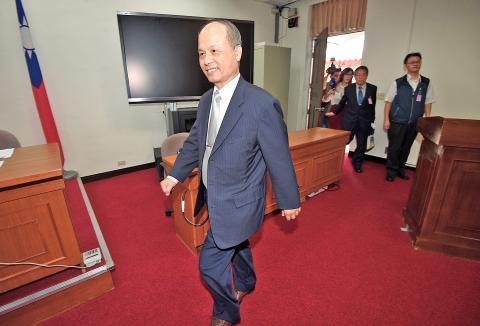Minister of Finance Chang Sheng-ford (張盛和) yesterday said he would respect a legislative decision to amend the stock transaction and capital gains taxes, as the rapid global slowdown warrants economically friendly policies.
The legislature today is expected to approve proposals to cut the stock transaction tax from 0.3 percent to 0.25 percent and set the capital gains tax at 0.05 percent.
The planned change, the fourth of its kind in three years, would leave tax burdens intact for most investors, but would spare active traders a 0.1 percent levy on share transactions totaling NT$1 billion (US$30.62 million) within a year.

Photo: Lo Pei-der, Taipei Times
“The proposed revision has turned from taxation into a political issue,” Chang told reporters.
Chinese Nationalist Party (KMT) presidential candidate Hung Hsiu-chu (洪秀柱) proposed the revision to woo stock investors, Chang said.
The move might also help to settle the longstanding controversy over changes to the taxes and end the policy uncertainty once and for all, Chang added.
The unexpected and rapid economic slowdown lent support to policies favorable to GDP growth, he said, adding that the taxation change could be considered a stimulus measure.
The nation’s export-oriented economy grew 3.84 percent in the first quarter, but slowed to 0.52 percent in the second quarter and is struggling to stay above zero this quarter due to faltering external demand.
The decline in exports showed signs of easing this month after reaching double-digit percentages the past three months, Chang said, adding that the landscape might improve next quarter due to Christmas sales.
To prop up the economy, the ministry is considering commodity tax cuts on new-car purchases and encouraging exports of used cars, Chang said.
While exports of used cars might not lift GDP growth much, it would help boost domestic demand and ease air pollution, as old cars tend to be less environmentally friendly, he said.
The ministry plans to cut the commodity tax for new car purchases by NT$30,000 to NT$50,000, but it is up to the Cabinet to finalize the details, the minister said.
Used cars are badly needed in emerging countries and generate significant revenue for exporters in South Korea and Japan, Chang said.
Used cars carry heavy weight in the local market as well, with two-year-old cars accounting for 50 percent of overall automobiles, the minister said.
The commodity tax cut would provide rental agencies incentives to buy new cars, he said.

In Italy’s storied gold-making hubs, jewelers are reworking their designs to trim gold content as they race to blunt the effect of record prices and appeal to shoppers watching their budgets. Gold prices hit a record high on Thursday, surging near US$5,600 an ounce, more than double a year ago as geopolitical concerns and jitters over trade pushed investors toward the safe-haven asset. The rally is putting undue pressure on small artisans as they face mounting demands from customers, including international brands, to produce cheaper items, from signature pieces to wedding rings, according to interviews with four independent jewelers in Italy’s main

Japanese Prime Minister Sanae Takaichi has talked up the benefits of a weaker yen in a campaign speech, adopting a tone at odds with her finance ministry, which has refused to rule out any options to counter excessive foreign exchange volatility. Takaichi later softened her stance, saying she did not have a preference for the yen’s direction. “People say the weak yen is bad right now, but for export industries, it’s a major opportunity,” Takaichi said on Saturday at a rally for Liberal Democratic Party candidate Daishiro Yamagiwa in Kanagawa Prefecture ahead of a snap election on Sunday. “Whether it’s selling food or

CONCERNS: Tech companies investing in AI businesses that purchase their products have raised questions among investors that they are artificially propping up demand Nvidia Corp chief executive officer Jensen Huang (黃仁勳) on Saturday said that the company would be participating in OpenAI’s latest funding round, describing it as potentially “the largest investment we’ve ever made.” “We will invest a great deal of money,” Huang told reporters while visiting Taipei. “I believe in OpenAI. The work that they do is incredible. They’re one of the most consequential companies of our time.” Huang did not say exactly how much Nvidia might contribute, but described the investment as “huge.” “Let Sam announce how much he’s going to raise — it’s for him to decide,” Huang said, referring to OpenAI

The global server market is expected to grow 12.8 percent annually this year, with artificial intelligence (AI) servers projected to account for 16.5 percent, driven by continued investment in AI infrastructure by major cloud service providers (CSPs), market researcher TrendForce Corp (集邦科技) said yesterday. Global AI server shipments this year are expected to increase 28 percent year-on-year to more than 2.7 million units, driven by sustained demand from CSPs and government sovereign cloud projects, TrendForce analyst Frank Kung (龔明德) told the Taipei Times. Demand for GPU-based AI servers, including Nvidia Corp’s GB and Vera Rubin rack systems, is expected to remain high,